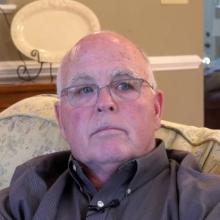
David Sloan
Lane High SchoolAnd I remember we’d play tackle football at Belmont Park with various other areas of the city, that kids ride their bikes over and we’d have a knock-down-drag-out, good old-fashioned tackle football game. And the kids from Ridge Street would come. So, this guy named Howard Swift got up, and Howard, Frankie, we called him — do you know him?
Lorenzo Dickerson: He lives in my neighborhood.
David Sloan: I’ll be danged. One of the kindest, gentlest human beings you’ll ever know, very diminutive, small guy. Loves sports but was never big enough really to play any of them. And so, I invited Frankie to come, and Frankie invited some other guys that I went to high school with, junior high school and high school with, actually. And Frankie lived on the east side of Ridge Street, so he had to go to Clark. And the Black kids that lived on the west side of Ridge Street went to Johnson. Johnson was heavily influenced by the liberal faculty, and so forth, of the University of Virginia, so it was a little bit of a different climate over there. Belmont was pretty —
George Gilliam: Pretty conservative.
David Sloan: Pretty conservative, working class, tough guys. So, Frankie got up at this group. What we did was, we got together at Washington Park, which for me is always a symbolic park because we wouldn’t go to Washington Park when I was a kid. You would not ride your bike to Washington Park. It’s just the way it was. And so, to me, it’s now a park open and everybody can enjoy it, and it’s still right in the middle of the city. And so, we met at Washington Park, and everybody introduced themselves and talked a little bit about what they’ve been doing all their lives. All these people were born in the ’50s. And Frankie got up and told a story I had never heard before, which was that he was scared to death about his first day at Clark Elementary School because he was afraid that he was going to get beat up, either on his way to school or on his way back to school. He said told his mom and dad the night before and they said, “Well, we can take you to school but we can’t pick you up from school.” So, he knew he was going to have to walk from Clark back to his house on Ridge Street. And he said that, and this is a quote, he said, “I met this white boy and his name was David Sloan, and he walked me home.” And it just about made me cry, which is where I’m close to right now because I had no idea at the time, but my dad was a cop. He dealt with a lot of low-income White and Black people, but we all know, if you open your eyes and your heart to it, that it was a hard time for Black people. Still is. And a hard time for people just with modest economic means. They’re the ones that seemingly get in the most trouble, certainly back then, it seemed to be that way.